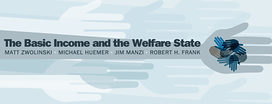Robert Frank writes,
[E]quating taxation and theft was not a compelling position in the first place. A country without the power to tax couldn’t field an army and would soon be overrun by a country that had one. Its residents would then have to pay taxes to that country.
Presumably, the second and third statements above are supposed to support or explain the first statement … only they don’t. “If I don’t do X, then something bad will happen; therefore, X is not a form of theft” is an invalid argument. So is “If I don’t do X, then someone else will commit a theft; therefore, X isn’t theft.” These are non sequiturs.
At best, the premises might be said to show that taxation is justified even if it is theft. That is a perfectly understandable view. But that won’t do to support the rest of what Frank wants to say: namely, that a basic-income-plus-public-work scheme is ethically permissible. From the premise that taxation is justified to prevent a Russian invasion (or similar event), it does not follow that taxation is justified to implement a social welfare program.
Compare this case: Jean Valjean steals a loaf of bread to feed his sister’s children. Assume that the children would otherwise have starved. It does not follow from this that he didn’t really steal the bread. At most, what follows is that the theft was justified. But one cannot now go on to infer that it would be permissible for me to steal bread for some entirely different purpose – for instance, to feed the ducks at the local pond. Stealing to feed the ducks might be justified nonetheless – but some other argument would have to be given.
Similarly, stealing in order to provide social welfare might be justified, but some argument other than the appeal to national defense would need to be given.

